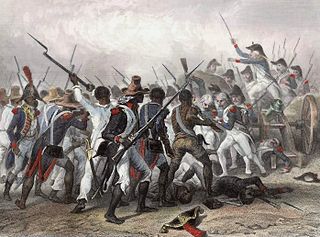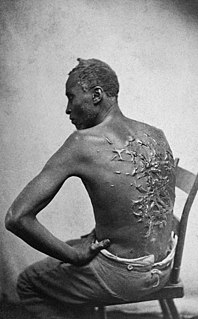Defamation is the oral or written communication of a false statement about another that unjustly harms their reputation and usually constitutes a tort or crime. In several countries, including South Korea, a true statement can also be considered defamation.

Peon usually refers to a person subject to peonage: any form of wage labor in which a laborer (peon) has little control over employment conditions. Peon and peonage can refer to both the colonial period and post-colonial period of Latin America as well as the period after the end of slavery in the United States, when "Black Codes" were passed to retain African American freedmen as labor through other means.

Capital punishment is a legal penalty under the criminal justice system of the United States federal government. It can be imposed for treason, espionage, murder, large-scale drug trafficking, or attempted murder of a witness, juror, or court officer in certain cases.
The Stono Rebellion was a slave revolt that began on 9 September 1739, in the colony of South Carolina. It was the largest slave rebellion in the Southern Colonies, with 25 colonists and 35 to 50 Africans killed. The uprising was led by native Africans who were likely from the Central African Kingdom of Kongo, as the rebels were Catholic and some spoke Portuguese.

The slave codes were laws relating to slavery and enslaved people, specifically regarding the Atlantic slave trade and chattel slavery in the Americas.

Denmark Vesey was a Black American leader in Charleston, South Carolina. He worked as a carpenter. In June 1822 he was accused and convicted of being the leader of "the rising," a potentially major slave revolt which was scheduled to take place in the city on July 14. He was executed on July 2.

The Barbados Slave Code of 1661, officially titled as An Act for the better ordering and governing of Negroes, was a law passed by the colonial English legislature to provide a legal basis for slavery in the Caribbean island of Barbados. It is the first comprehensive Slave Act, and the code's preamble, which stated that the law's purpose was to "protect them [slaves] as we do men's other goods and Chattels", established that black slaves would be treated as chattel property in the island's court.
Gregg v. Georgia, Proffitt v. Florida, Jurek v. Texas, Woodson v. North Carolina, and Roberts v. Louisiana, 428 U.S. 153 (1976), reaffirmed the United States Supreme Court's acceptance of the use of the death penalty in the United States, upholding, in particular, the death sentence imposed on Troy Leon Gregg. Referred to by a leading scholar as the July 2 Cases and elsewhere referred to by the lead case Gregg, the Supreme Court set forth the two main features that capital sentencing procedures must employ in order to comply with the Eighth Amendment ban on "cruel and unusual punishments". The decision essentially ended the de facto moratorium on the death penalty imposed by the Court in its 1972 decision in Furman v. Georgia 408 U.S. 238 (1972).

The Black Codes, sometimes called Black Laws, were laws governing the conduct of African Americans. In 1832, James Kent wrote that "in most of the United States, there is a distinction in respect to political privileges, between free white persons and free colored persons of African blood; and in no part of the country do the latter, in point of fact, participate equally with the whites, in the exercise of civil and political rights." Although Black Codes existed before the Civil War and many Northern states had them, it was the Southern U.S. states that codified such laws in everyday practice. The best known of them were passed in 1865 and 1866 by Southern states, after the American Civil War, in order to restrict African Americans' freedom, and to compel them to work for low wages.
Slave patrols—traditionally known as patrollers, patterrollers, pattyrollers or paddy rollers by enslaved persons of African descent—were organized groups of armed men who monitored and enforced discipline upon slaves in the antebellum U.S. southern states. The slave patrols' function was to police enslaved persons, especially those who escaped or were viewed as defiant. They also formed river patrols to prevent escape by boat.

In the British colonies in North America and in the United States before the abolition of slavery in 1865, free Negro or free Black described the legal status of African Americans who were not enslaved. The term was applied both to formerly enslaved people (freedmen) and to those who had been born free.

Convict leasing was a system of forced penal labor which was historically practiced in the Southern United States and overwhelmingly involved African-American men. Recently, a form of the practice has been instituted in western states. In the earlier forms of the practice, convict leasing provided prisoner labor to private parties, such as plantation owners and corporations. The lessee was responsible for feeding, clothing, and housing the prisoners.

The New York Slave Revolt of 1712 was an uprising in New York City, in the Province of New York, of 23 enslaved Africans. They killed nine whites and injured another six before they were stopped. More than three times that number of black people, 70, were arrested and jailed. Of these, 27 were put on trial, and 21 convicted and executed.

When the Dutch and Swedes established colonies in the Delaware Valley of what is now Pennsylvania, in North America, they quickly imported African slaves for workers; the Dutch also transported them south from their colony of New Netherland. Slavery was documented in this area as early as 1639. William Penn and the colonists who settled Pennsylvania tolerated slavery, but the English Quakers and later German immigrants were among the first to speak out against it. Many colonial Methodists and Baptists also opposed it on religious grounds. During the Great Awakening of the late 18th century, their preachers urged slaveholders to free their slaves. High British tariffs in the 18th century discouraged the importation of additional slaves, and encouraged the use of white indentured servants and free labor.

William Henry (Harrison) Heard was a clergyman of the African Methodist Episcopal Church who served as United States Ambassador to Liberia from 1895 through 1898.
Anti-literacy laws in many slave states before and during the American Civil War affected slaves, freedmen, and in some cases all people of color. Some laws arose from concerns that literate slaves could forge the documents required to escape to a free state. According to William M. Banks, "Many slaves who learned to write did indeed achieve freedom by this method. The wanted posters for runaways often mentioned whether the escapee could write." Anti-literacy laws also arose from fears of slave insurrection, particularly around the time of abolitionist David Walker's 1829 publication of Appeal to the Colored Citizens of the World, which openly advocated rebellion, and Nat Turner's slave rebellion of 1831.

The treatment of enslaved people in the United States varied by time and place, but was generally brutal, especially on plantations. Whipping and rape were routine, but usually not in front of white outsiders, or even the plantation owner's family. An enslaved person could not be a witness against a white; enslaved people were sometimes required to whip other enslaved people, even family members. There were also businesses to which a slave owner could turn over the whipping. Families were often split up by the sale of one or more members, usually never to see or hear of each other again. There were some relatively enlightened slave owners—Nat Turner said his master was kind—but not on large plantations. Only a small minority of enslaved people received anything resembling decent treatment; one contemporary estimate was 10%, not without noting that the ones well treated desired freedom just as much as those poorly treated. Good treatment could vanish upon the death of an owner. As put by William T. Allan, a slaveowner's abolitionist son who could not safely return to Alabama, "cruelty was the rule, and kindness the exception".

This article examines South Carolina's history with an emphasis on the lives, status, and contributions of African Americans. African slaves first arrived in the region in 1526, and the institution of slavery remained until the end of the Civil War in 1865. Until slavery's abolition, the free black population of South Carolina never exceeded 2%. Beginning during the Reconstruction Era, African Americans were elected to political offices in large numbers, leading to South Carolina's first majority-black government. Toward the end of the 1870s however, the Democratic Party regained power and passed laws aimed at disenfranchising African Americans, including the denial of the right to vote. Between the 1870s and 1960s, African Americans and whites lived segregated lives; people of color and whites were not allowed to use the same schools or public facilities. African Americans were treated as second-class citizens leading to the civil rights movement in the 1960s. In modern America, African Americans constitute 22% of the state's legislature, and in 2014, the first African American U.S. Senator since Reconstruction, Tim Scott, was elected. In 2015, the Confederate flag was removed from the South Carolina Statehouse after the Charleston church shooting.
The New York slave codes were a series of slave codes passed in the Province of New York to regulate slavery. The first slave code was passed in 1702, with major expansions passing in 1712 and 1730 in response to slave insurrections.










